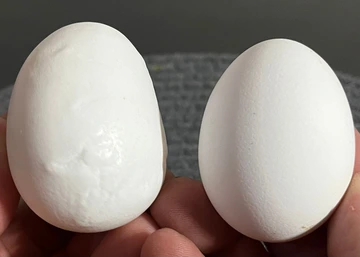Eggs from backyard flocks can be a safe and nutritious food, but they also carry risks if not handled properly. Chickens may harbor bacteria such as Salmonella without showing signs of illness, and these bacteria can contaminate the shell—or even the inside of the egg—before it is laid. Contaminated eggs can lead to serious illness, especially for children, older adults, and those with weakened immune systems. This resource will help you practice safe egg production and handling by covering hygiene practices, proper collection and storage methods, and how to recognize egg abnormalities that may affect quality and safety.
Coop and feed management
- Keep the coop clean and change the bedding regularly to reduce bacteria and parasite buildup.
- Clean food and water containers daily to prevent contamination and illness.
- Store feed in a cool, dry, airtight, and rodent-proof container.
- Check feed regularly for signs of mold or pests and discard immediately if either are found.
Collection and cleaning
- Collect eggs frequently (at least 1-2 times a day) to keep them clean and prevent exposure to heat, cold, or moisture.
- Discard eggs that are soiled, cracked, or leaking, or if debris cannot be removed with a dry brush.
- Store eggs in the refrigerator and avoid washing, as this removes the natural protective “bloom.”
- If you must wash a dirty egg, use water that is slightly warmer than the egg and use immediately.
Storage
- Refrigerate eggs as soon as possible after collecting them. Keep eags at or below 45°F.
- Do not leave refrigerated eggs out for more than two hours.
- Unwashed eggs can be stored in a carton for up to 2-3 months in a standard household refrigerator.
- Do not store in refrigerator door to avoid temperature fluctuations.
Hygiene
- Thoroughly wash hands with warm water and soap before and after handling chickens and eggs.
- Avoid touching your face and food before washing hands.
- Have designated shoes and clothing for working with your flock.
- Change and wash soiled clothing promptly.
Cooking
- Cook eggs to an internal temperature of 160°F.
- Ensure whites are cooked through and yolks begin to thicken, without being runny.
- Serve eggs and egg-rich foods immediately or cool and refrigerate promptly.
- Refrigerate leftovers within 2 hours and use within 4 days.
- Read Shell Eggs from Farm to Table from the USDA to learn more about food safety guidelines.
Abnormalities
Internal abnormalities
- Blood spots are small particles of blood that may be found in the yoke or within the egg whites. This is a normal finding and is safe to eat. It is caused from small blood vessels breaking within the hens reproduction tract.
- Discolored yokes can vary significantly from egg to egg. This is caused by the differences in their diet or if they are free ranged with access to other plants and bugs.
- Runny egg white (runny albumen). The consistency of the egg whites can vary in older hens and can be a normal finding from older hens. Although, it may also be a sign of illness, so if you suspect illness, it is best to not consume the egg.
External abnormalities
- Thin shells often indicate low calcium levels. To correct this, offer oyster shells to your feed or provide separately. This can also occur in older hens and may not always be a nutritional issue.
- Misshapen eggs can result from variable causes. If a hen consistently lays abnormal eggs, it’s best to isolate her and consult a veterinarian, as it could be a sign of illness or infection.

The egg on the left shows an irregular shell while the egg on the right has a normal, smooth shell.
Faye Munoz, University of Arizona College of Veterinary Medicine
Floating eggs
After laying, eggs cool and their contents shrink, causing the internal air pocket to grow. When this air pocket becomes large enough, the egg will float in water. These eggs are often of lower quality, but not always unsafe to eat. As a tip, crack floating eggs into a separate bowl and check for off smells or unusual smells before cooking with them or discarding them.
Selling eggs
It's important to understand and follow your local regulations to ensure safety and compliance.
- Arizona residents should review egg inspection information provided by the Arizona Department of Agriculture.
- For those outside Arizona, the National Egg Regulatory Officials have a list of egg laws by state.

